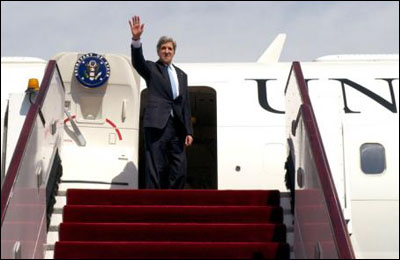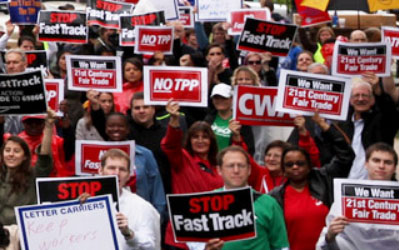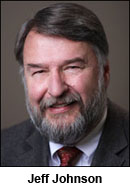OPINION
If only Secretary Kerry met with workers about Fast Track, TPP
By JEFF JOHNSON
(May 19, 2015) — I wish that the Honorable Secretary of State John Kerry was visiting Washington at a site other than the Boeing Company and for purposes other than speaking about Fast Track and the Trans Pacific Partnership (TPP).
 The Secretary probably won’t see workers, including machinists and engineers, community and faith members outside the Renton gates this morning, protesting what they know from their experience and what they know in their hearts is not a “new” and “modern” trade deal. Fair trade is a good thing. But all trade and ever-increasing trade is not necessarily good for the average working person either here or in our trading partner’s countries.
The Secretary probably won’t see workers, including machinists and engineers, community and faith members outside the Renton gates this morning, protesting what they know from their experience and what they know in their hearts is not a “new” and “modern” trade deal. Fair trade is a good thing. But all trade and ever-increasing trade is not necessarily good for the average working person either here or in our trading partner’s countries.
With each trade deal since NAFTA, the American worker has lost jobs, income, and a feeling of economic security. Sure, in some industries, high-tech for example, the CEOs, stockholders and advanced degree workers have prospered. But that is precisely part of the problem. Trade deals past and present have been written to enhance the wealth of the 1 percent and have contributed to the extreme income inequality both nationally and in our state.
Secretary Kerry, we would love for you to come to the Washington State Labor Council’s Hall in the International District and speak to working people from our unions and the wider community about how specifically Fast Track and the TPP will help create a broadly shared prosperity. Walk through with us the sections of Fast Track that state Congressional goals and objectives that were put in place before the negotiations for TPP began five years ago and the metrics that our representatives and the public can use to assess whether these goals and objectives can ever be met.
 Help us understand what makes the labor, human rights, and environmental standards in TPP any more enforceable than in previous trade agreements. The May 10 standards are nice words on the page, but according to Congress’ own research arm unenforceable and ineffective.
Help us understand what makes the labor, human rights, and environmental standards in TPP any more enforceable than in previous trade agreements. The May 10 standards are nice words on the page, but according to Congress’ own research arm unenforceable and ineffective.
Talk to us about how a non-governmental, non-accountable Investor State Dispute Tribunal, which determines whether public policy is detrimental to the potential future profits of corporations filing suit against governments, is in best interest of the common good. For instance, is there a formula for deciding how much the public must compensate companies that lose sales and revenue because of public policy intended to create improved health outcomes?
Brainstorm with us on how lowering trade barriers without an effective way of stopping currency manipulation can prevent the loss of comparative advantage for countries. Or how we can achieve a national tax policy that puts an end to the incentive for U.S. companies to offshore jobs and production. Or how we can improve labor laws in the U.S. that level the playing field so that workers in the aerospace supply sector and high-tech sectors of our state can organize for a voice at work without any corporate interference. Or how we establish an industrial policy that allows us to fit international trading objectives into a national policy of providing family-level incomes and benefits across economic sectors.
These are the types of discussions the American worker and our community partners want to have, deserve to have, and are organizing around. We are not interested in talking points and sound bytes about how these trade deals are somehow “modern” trade deals that are different than the ones from a few years ago.
The American worker is asking for the respect and dignity to be included in the dialogue about how our economy and society gets restructured. And we want to start by working together on the question of how do we create broadly shared prosperity for all of us, not just the corporate elite, and an environment that is healthy and sustainable for our grandchildren and theirs’ to come. This is the lens through which we view these issues.
 Jeff Johnson is President of the Washington State Labor Council, AFL-CIO, the largest labor organization in the Evergreen State, representing the interests of more than 500 local unions and 400,000 rank-and-file union members.
Jeff Johnson is President of the Washington State Labor Council, AFL-CIO, the largest labor organization in the Evergreen State, representing the interests of more than 500 local unions and 400,000 rank-and-file union members.





